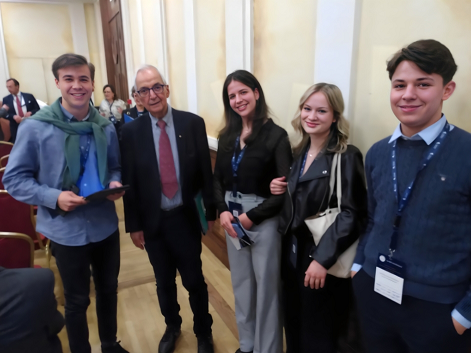Low-cost flights and corporate sustainability – Interview with former German minister and UNO director

Professor Klaus Töpfer visited the Corvinus University of Budapest to participate in the 30th anniversary celebrations of the German-language programme in management (DSG). The DSG students interviewed the former director of UNEP on the occasion of the visit, in which they also asked the international expert of the field on the responsibility of companies in relation to sustainability.
The authors with Prof. Klaus Töpfer at the Corvinus University of Budapest; Photo: Prof. Ulrich Bartosch, President of the University of Passau
DSG students: Welcome, Professor! Thank you very much for accepting our request. Within the Marketing subject of the DSG programme, we would like to ask you questions about marketing and sustainability.
My first question is this: What is the biggest challenge for economic policy in achieving today’s sustainability goals?
Prof. Dr Klaus Töpfer: Thank you for having invited me! First, we need to clarify what sustainability means for us. I have discussed this in several of my works. I see sustainability in the UN system as bringing together economic efficiency, stability, social justice and ecological responsibility. I was just talking to the Head of the DSG, Dr. Huszak, about the EU trying to make a difference. Unfortunately, the “ecological responsibility” aspect has been neglected so far, which is why we need to continue the work we have started. Only a strong sense of responsibility can create an economy that is beneficial in the social sense. This is not an easy task, but it is absolutely necessary if we want to go beyond mere proposals, which often do not deliver real results.
DSG students: On the corporate side, what changes and impacts are market players facing?
Prof. Dr Klaus Töpfer: The “good” companies have already proven that sustainability is essential for their economic success – the latter is quoted from a large company publication. In the brochure, they say it’s at the heart of their strategy… This shows how hard they try to at least look good. On the other hand, one thing has become clear to everyone in the economy: you can no longer be economically successful without sustainability goals. Your actions should be linked to sustainability goals, especially environmental and social goals. If the brochure is to be trusted, we are already doing quite well on the social side. But the text must also be implemented on the ecological side. The demand is there, it is time for supply to adapt. The biggest companies don’t just talk about it for the sake of advertising: if you confront them with their advertising slogans, they can answer with statistics, just look at the news, meeting the three sustainability targets is now a must.
DSG students: Our course project is about Ryanair and low-cost airlines. What do you think low-cost airlines can do to achieve real sustainability?
Prof. Dr Klaus Töpfer: The “nothing can be done” attitude is wrong. This used to be typical of low-cost airlines and is not the reality. There are of course many things an airline can do. They are already working on it – thank God. They are looking for solutions, developing new fuels to power their aircraft. If we get electric cars, we will also get electric planes. There is already progress being made with hydrogen, there is CO2-free gas, so there is a lot that the experts can do to help. These initiatives should be supported, it is simply a matter of making it worthwhile for airlines to look for such alternatives.
The other thing we see is the folklore around the subject. It is too early for corporate players to feel that they are on track, that is simply greenwashing. I don’t want to be pessimistic, but the airlines’ ‘net-zero’ campaigns are still just a publicity stunt, and I fear that they will continue to feel empowered to burn unlimited fuel.
DSG students: So you think there is rarely any real content behind their campaigns?
Prof. Dr Klaus Töpfer: Exactly. They use a variety of fake marketing tools.
DSG students: Is this true for all airlines?
Prof. Dr Klaus Töpfer: No, I haven’t studied Ryanair that intensively, but what I can say is that you should always look at where there is room for improvement, what could be done better in small steps. It is good that sustainability is at the heart of corporate strategy, but we also need to see if there is real substance behind it. Unfortunately, not many people have convinced me of that yet. Airlines also know that a convincing concept and the use of tiny, noticeable steps are essential – it is not enough to glorify the goals, goals need to be achieved – right down to the design of the aircraft. Unfortunately, a low-cost airline will be the last to do so.
DSG students: That’s a pity. Thank you very much for the interview!
(Authors: József Knáb, Zsuzsanna Tóth, Réka Vécsey and János Urbancsek)